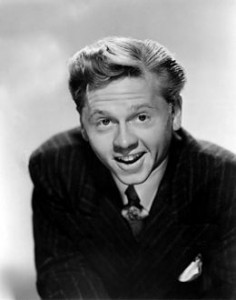Mickey Rooney

Mickey Rooney: Private Screenings
From 1997, Robert Osborne sits down and interviews the most talented man in hollywood, this content is ownd by warner brothers, no copyright infringment intended Be sure to like my channel on facebook. https://www.facebook.com/pages/Tomy98…
Mickey Rooney (born Joseph Yule, Jr.; born September 23, 1920 – died April 6, 2014) was an American film actor and entertainer whose film, television, and stage appearances spanned nearly his entire lifetime.
He received multiple awards, including a Juvenile Academy Award, an Honorary Academy Award, two Golden Globes and an Emmy Award. Working as a performer since he was a child, he was a superstar as a teenager for the films in which he played Andy Hardy, and he has had one of the longest careers of any actor, spanning 92 years actively making films in ten decades, from the 1920’s to the 2010s. For a younger generation of fans, he gained international fame for his leading role as Henry Dailey in The Family Channel‘s The Adventures of the Black Stallion.
Upon his death in April 2014, along with Jean Darling, Carla Laemmle, and Baby Peggy, Rooney was one of the last surviving stars who worked in the silent film era. He was also the last surviving cast member of several films in which he appeared during the 1930’s and 1940’s.
Early Life
Rooney was born Joseph Yule, Jr. in the Brooklyn borough of New York City. His father, Joe Yule (born Ninnian Joseph Ewell), was from Glasgow, Scotland, and his mother, Nellie W. (née Carter), was from Kansas City, Missouri. Both of his parents were in vaudeville, appearing in a Brooklyn production of A Gaiety Girl when Joseph, Jr. was born. He began performing at the age of 17 months as part of his parents’ routine, wearing a specially tailored tuxedo.
When he was fourteen months old, unknown to everyone, he crawled onstage wearing overalls and a little harmonica around his neck. He sneezed and his father, Joe Sr., grabbed him up, introducing him to the audience as Sonny Yule. He felt the spotlight on him and has described it as his mother’s womb. From that moment on, the stage was his home.
While Joe Sr. was traveling, Joe Jr. and his mother moved from Brooklyn to Kansas City to live with his aunt. While his mother was reading the entertainment newspaper, Nellie was interested in getting Hal Roach to approach her son to participate in the Our Gang series in Hollywood. Roach offered $5 a day to Joe, Jr., while the other young stars were paid five times more.
As he was getting bit parts in films, he was working with other established film stars such as Joel McCrea, Colleen Moore, Clark Gable, Douglas Fairbanks, Jr., and Jean Harlow. While selling newspapers around the corner, he also entered into Hollywood Professional School, where he went to school with dozens of unfamiliar students such as: Joseph A. Wapner, Nanette Fabray, Judy Garland, Lana Turner, among many others, and later Hollywood High School, where he graduated in 1938.
Career – Mickey McGuire
The Yules separated in 1924 during a slump in vaudeville, and in 1925, Nell Yule moved with her son to Hollywood, where she managed a tourist home. Fontaine Fox had placed a newspaper ad for a dark-haired child to play the role of “Mickey McGuire” in a series of short films. Lacking the money to have her son’s hair dyed, Mrs. Yule took her son to the audition after applying burnt cork to his scalp. Joe got the role and became “Mickey” for 78 of the comedies, running from 1927 to 1936, starting with Mickey’s Circus, released September 4, 1927. These had been adapted from the Toonerville Trolley comic strip, which contained a character named Mickey McGuire. Joe Yule briefly became Mickey McGuire legally in order to trump an attempted copyright lawsuit (if it was his legal name, the film producer Larry Darmour did not owe the comic strip writers royalties). His mother also changed her surname to McGuire in an attempt to bolster the argument, but the film producers lost. The litigation settlement awarded damages to the owners of the cartoon character, compelling the twelve-year-old actor to refrain from calling himself Mickey McGuire on- and offscreen.
Rooney later claimed that, during his Mickey McGuire days, he met cartoonist Walt Disney at the Warner Brothers studio, and that Disney was inspired to name Mickey Mouse after him, although Disney always said that he had changed the name from “Mortimer Mouse” to “Mickey Mouse” on the suggestion of his wife.
During an interruption in the series in 1932, Mrs. Yule made plans to take her son on a ten-week vaudeville tour as McGuire, and Fox sued successfully to stop him from using the name. Mrs. Yule suggested the stage name of Mickey Looney for her comedian son, which he altered slightly to Rooney, a less frivolous version. Rooney made other films in his adolescence, including several more of the McGuire films, and signed with Metro-Goldwyn-Mayer in 1934. MGM cast Rooney as the teenage son of a judge in 1937’s A Family Affair, setting Rooney on the way to another successful film series.
“Andy Hardy” and Judy Garland
 Rooney with Judy Garland in Love Finds Andy Hardy (1938)
Rooney with Judy Garland in Love Finds Andy Hardy (1938)
In 1937, Rooney was selected to portray Andy Hardy in A Family Affair, which MGM had planned as a B-movie. Rooney provided comic relief as the son of Judge James K. Hardy, portrayed by Lionel Barrymore (although Lewis Stone would play the role of Judge Hardy in subsequent films). The film was an unexpected success, and led to 13 more Andy Hardy films between 1937 and 1946, and a final film in 1958. Rooney also received top billing as “Shockey Carter” in Hoosier Schoolboy (1937).
Also in 1937, Rooney made his first film alongside Judy Garland with Thoroughbreds Don’t Cry. Garland and Rooney became close friends and a successful song-and-dance team. Besides three of the Andy Hardy films, where she portrayed Betsy Booth, a younger girl with a crush on Andy, they appeared together in a string of successful musicals, including the Oscar-nominated Babes in Arms (1939). During an interview in the 1992 documentary film MGM: When the Lion Roars, Rooney describes their friendship:
“Judy and I were so close we could’ve come from the same womb. We weren’t like brothers or sisters but there was no love affair there; there was more than a love affair. It’s very, very difficult to explain the depths of our love for each other. It was so special. It was a forever love. Judy, as we speak, has not passed away. She’s always with me in every heartbeat of my body.”
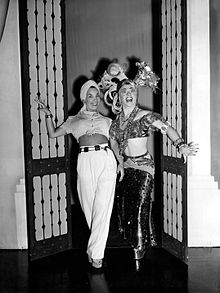 With Carmen Miranda backstage at Babes on Broadway (1941)
With Carmen Miranda backstage at Babes on Broadway (1941)
Rooney’s breakthrough-role as a dramatic actor came in 1938’s Boys Town opposite Spencer Tracy as Whitey Marsh, which opened shortly before his 18th birthday. Rooney was awarded a special Juvenile Academy Award in 1939 and was named the biggest box-office draw in 1939, 1940 and 1941. A well-known entertainer by the early 1940’s, his picture appeared on the cover of the March 18, 1940 issue of Time magazine, timed to coincide with the release of Young Tom Edison; the cover story began:
“Hollywood’s No. 1 box office bait in 1939 was not Clark Gable, Errol Flynnor Tyrone Power, but a rope-haired, kazoo-voiced kid with a comic-strip face, who until this week had never appeared in a picture without mugging or overacting it. His name (assumed) was Mickey Rooney, and to a large part of the more articulate U. S. cinema audience, his name was becoming a frequently used synonym for brat.”
Rooney, with Garland, was one of many celebrities caricatured in Tex Avery‘s 1941 Warner Bros. cartoon Hollywood Steps Out. In 1991, Rooney was honored by the Young Artist Foundation with its Former Child Star “Lifetime Achievement” Award recognizing his achievements within the film industry as a child actor. After presenting the award to Rooney, the foundation subsequently renamed the accolade “The Mickey Rooney Award” in his honor.
After The War
 Rooney entertaining troops in 1945
Rooney entertaining troops in 1945
In 1944, Rooney enlisted in the United States Army. He served more than 21 months, until shortly after the end of World War II. During and after the war he helped entertain the troops in America and Europe, and spent part of the time as a radio personality on the American Forces Network and was awarded the Bronze Star Medal for entertaining troops in combat zones. In addition to the Bronze Star Medal, Rooney also received the Army Good Conduct Medal, American Campaign Medal, European-African-Middle Eastern Campaign Medal, and World War II Victory Medal for his military service.
After his return to civilian life, his career slumped. He appeared in a number of films, including Words and Music in 1948, which paired him for the last time with Garland on film (he appeared with her on one episode as a guest on her CBS variety series in 1963). He briefly starred in a CBS radio series, Shorty Bell, in the summer of 1948, and reprised his role as “Andy Hardy”, with most of the original cast, in a syndicated radio version of The Hardy Family in 1949 and 1950 (repeated on Mutual during 1952).
His first television series, The Mickey Rooney Show: Hey, Mulligan (created by Blake Edwards with Rooney as his own producer), appeared on NBC television for 32 episodes between August 28, 1954 and June 4, 1955. In 1951, he directed a feature film for Columbia Pictures, My True Story starring Helen Walker. Rooney also starred as a ragingly egomaniacal television comedian in the live 90-minute television drama The Comedian, in the Playhouse 90 series on the evening of Valentine’s Day in 1957, and as himself in a revue called The Musical Revue of 1959 based on the 1929 film The Hollywood Revue of 1929, which was edited into a film in 1960, by British International Pictures.
In 1958, Rooney joined Dean Martin and Frank Sinatra in hosting an episode of NBC’s short-lived Club Oasis comedy and variety show. In 1960, Rooney directed and starred in The Private Lives of Adam and Eve, an ambitious comedy known for its multiple flashbacks and many cameos. In the 1960s, Rooney returned to theatrical entertainment. He still accepted film roles in undistinguished films, but occasionally would appear in better works, such as Requiem for a Heavyweight (1962), It’s a Mad, Mad, Mad, Mad World (1963), and The Black Stallion (1979). One of Rooney’s more controversial roles came in the highly-acclaimed 1961 film Breakfast at Tiffany’s where he played a stereotyped buck-toothed myopic Japanese character, I.Y. Yunioshi, neighbor of the main character, Holly Golightly. Despite Rooney’s protests that he was congratulated for the role by Asians, that role would later be held up as one of the most notorious examples of Hollywood’s history of stereotypical depictions of that racial group.
On December 31, 1961, he appeared on television’s What’s My Line and mentioned that he had already started enrolling students in the MRSE (Mickey Rooney School of Entertainment). His school venture never came to fruition. This was a period of professional distress for Rooney; as a childhood friend, director Richard Quine put it: “Let’s face it. It wasn’t all that easy to find roles for a 5-foot-3 man who’d passed the age of Andy Hardy.” In 1962, his debts had forced him into filing for bankruptcy.
In 1966, while Rooney was working on the film Ambush Bay in the Philippines, his wife Barbara Ann Thomason (akas: Tara Thomas, Carolyn Mitchell), a former pinup model and aspiring actress who had won 17 straight beauty contests in Southern California, was found dead in their bed. Beside her was her lover, Milos Milos, an actor friend of Rooney’s. Detectives ruled it murder-suicide, which was committed with Rooney’s own gun.
Rooney was awarded an Academy Juvenile Award in 1938, and in 1983 the Academy of Motion Picture Arts and Sciences voted him their Academy Honorary Award for his lifetime of achievement. He was mentioned in the 1972 song “Celluloid Heroes” by The Kinks: “If you stomped on Mickey Rooney/ He’d still turn ’round and smile…”
Character Actor
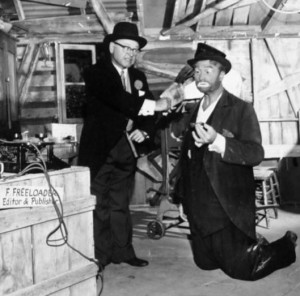 Rooney on The Red Skelton Show, 1962
Rooney on The Red Skelton Show, 1962
In addition to his movie roles, Rooney made numerous guest-starring roles as a character actor for nearly six decades, beginning with an episode of Celanese Theatre. The part led to other roles on such television series as Schlitz Playhouse, Playhouse 90, Producers’ Showcase, Alcoa Theatre, Wagon Train, General Electric Theater, Hennesey,The Dick Powell Theatre, Arrest and Trial, Burke’s Law, Combat!, The Fugitive, Bob Hope Presents the Chrysler Theatre, The Jean Arthur Show, The Name of the Game, Dan August, Night Gallery, The Love Boat, Kung Fu: The Legend Continues, among many others.
Television, stage, Bill, and The Black Stallion
Rooney made a successful transition to television and stage work. In 1961, he guest-starred in the 13-week James Franciscus adventure–drama CBS television series The Investigators. In 1962, he was cast as himself in the episode “The Top Banana” of the CBS sitcom, Pete and Gladys, starring Harry Morgan and Cara Williams.
In 1963, he entered CBS’s The Twilight Zone, giving a one-man performance in the episode “The Last Night of a Jockey“. Also in 1963, in ‘The Hunt’ episode 9, season 1 for Suspense Theater, he played the sadistic sheriff hunting the young surfer played by James Caan. In 1964, he launched another half-hour sitcom, Mickey, on ABC. The story line had “Mickey” operating a resort hotel in southern California. Son Tim Rooney appeared as Rooney’s teenaged son on this program, and Emmaline Henry starred as Rooney’s wife. It lasted 17 episodes, ending primarily due to the suicide of co-star Sammee Tong in October 1964.
He won a Golden Globe and an Emmy Award for his role in 1981’s Bill. Playing opposite Dennis Quaid, Rooney’s character was a mentally handicapped man attempting to live on his own after leaving an institution. He reprised his role in 1983’s Bill: On His Own, earning an Emmy nomination for the role.
Rooney provided the voices for four Christmas TV animated/stop action specials: Santa Claus Is Comin’ to Town (1970), The Year Without a Santa Claus (1974), Rudolph and Frosty’s Christmas in July (1979), and A Miser Brothers’ Christmas (2008)—always playing Santa Claus.
He continued to work on stage and television through the 1980s and 1990s, appearing in the acclaimed stage play Sugar Babies with Ann Miller beginning in 1979. Following this, he toured as Pseudelous in Stephen Sondheim’s A Funny Thing Happened on the Way to the Forum. In the 1990s, he returned to Broadway for the final months of Will Rogers Follies, playing the ghost of Will’s father. On television, he starred in the short-lived sitcom, One of the Boys, along with two unfamiliar young stars, Dana Carvey and Nathan Lane, in 1982. He toured Canada in a dinner theatre production of The Mind with the Naughty Man in the mid-1990’s. He played The Wizard in a stage production of The Wizard of Oz with Eartha Kitt at Madison Square Garden. Kitt was later replaced by Jo Anne Worley. In 1995 he starred with Charlton Heston, Peter Graves and Deborah Winters in the Warren Chaney docudrama America: A Call to Greatness. He also appeared in the documentaries That’s Entertainment! and That’s Entertainment! III, in both films introducing segments paying tribute to Judy Garland.
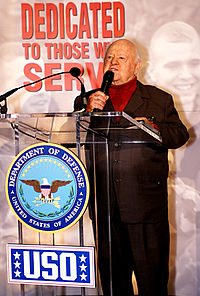 Actor Mickey Rooney speaks at the Pentagon in 2000 during a ceremony honoring the USO
Actor Mickey Rooney speaks at the Pentagon in 2000 during a ceremony honoring the USO
http://www.npr.org/2014/04/07/300101780/legendary-hollywood-star-mickey-rooney-dies-at-93
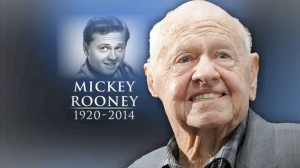 Legendary Hollywood Star Mickey Rooney Dies At 93 by THE ASSOCIATED PRESS
Legendary Hollywood Star Mickey Rooney Dies At 93 by THE ASSOCIATED PRESS
Mickey Rooney, the pint-size, precocious actor and all-around talent whose more than 90-year career spanned silent comedies, Shakespeare, Judy Garland musicals, Andy Hardy stardom, television and the Broadway theater, died Sunday at age 93.
Los Angeles Police Commander Andrew Smith said that Rooney was with his family when he died at his North Hollywood home.
Smith said police took a death report but indicated that there was nothing suspicious and it was not a police case. He said he had no additional details on the circumstances of his passing.
Rooney started his career in his parents’ vaudeville act while still a toddler, and broke into movies before age 10. He was still racking up film and TV credits more than 80 years later — a tenure likely unmatched in the history of show business.
“I always say, ‘Don’t retire — inspire,'” he told The Associated Press in March 2008. “There’s a lot to be done.”
Among his roles in recent years was a part as a guard in the smash 2006 comedy A Night at the Museum. Read more go to link below: http://www.npr.org/2014/04/07/300101780/legendary-hollywood-star-mickey-rooney-dies-at-93

